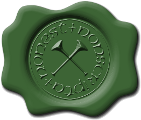
| Home | FAQs | Rules | Archives | Articles | Jobs | Links | KWHSS | OSCAR | SCA.org |
What is an S.C.A. Name?
Master Jasper Greensmith of the Seagirt Glen, and Dame Zenobia Naphtali
© Glen Fisher and Leslie A. Schweitzer (12/1/92)Your S.C.A. name is the name you'll use at S.C.A. activities. The S.C.A. models itself on Europe as it was before 1600 A.D., so the name you pick should be one that might actually have been used then. However, you shouldn't adopt the name of a real historical person; the S.C.A. doesn't reenact the events of those times, so historical figures don't belong at S.C.A. events. Your SCA name should also be different from your legal name, to reflect the difference between your modern and S.C.A. identities.
Most names within the S.C.A.'s period have two parts, a given name and a byname. A given name is a personal name (such as Caitlin, Rhys, Wulfric, or Elizabeth) which your parents would give you. (We don't call it a first name because it doesn't always come first. In Hungarian, for instance, the bynames come first, before the given name.)
Bynames originally distinguished between people with the same given name. Anything that could be used to tell two people apart could be used as a byname. For example, a large English town in the 13th century might have had Roger Baker (who baked bread for a living), Roger Johnson (whose father was names John), Roger Bigge (who was notably large), Roger Bywater (who lived by the river), and Roger London (who once lived in London).
Bynames were usually short, direct, earthy, and concrete, rather than long and fanciful; after all, they were used every day. As well, they were usually bestowed upon someone, and not chosen by them. One wouldn't be Robert the Philosophical Poet, but Robert Talkewell (who talks well), or, worse, Robert Boast.
Originally, children acquired by names of their own, different from their parents' (so John Baker's son might be Thomas Johnson). Later, some bynames became inherited surnames, as we have today, so Thomas Johnson's father might really be named Paul, and Edward Baker might actually be a goldsmith.
Middle names, as we use them today, didn't exist; most names had just a given name and a byname. The exceptions usually added a second byname to an inherited surname. For example, Nicholas Osbourne the blacksmith would be named Nicholas Osbourne Smith to distinguish him from Nicholas Osbourne the potter.
Names used only one language, or sometimes two. Most people didn't travel far from home, and knew just the one language they grew up with. The few who did travel did so mostly to make war or money (or both); rarely did they travel to settle in some distant, inhospitable land. As a result, names with two languages appeared only near kingdom or national borders, or as a result of major invasions or regular trade. Thus, it's reasonable to combine English and Danish, or French and German, because those people ran into each other regularly. On the other hand, mixing English and Arabic, or Hungarian and Irish, isn't reasonable, because those people interacted only rarely, if at all.
Where can you find good examples of period names? The best sources are actual period documents and literature. History books are also good; they can focus on the time and place that interest you. Browse through the many books specifically about names; they give you lots of names to choose from. (But stick with books that tell you when and where a name was used; without them, you can't be sure you've picked a good period name.) When you find a name you like, photocopy the page the name is on, and the title page of the book you found it in. (The heralds will need these, so best to copy them while you've got the book.) You'll usually end up finding the byname in a different book from the given name.
Your local and Kingdom heralds will be happy to help you choose a name. They'll also make sure that your name is yours alone, different from anyone else's. Make an appointment to get together with your herald and his books, or drop by a "Heraldic Consultation Table" at any event that has one.
Finally, once you think you've found a name, try it out. Make sure you like it. Will you answer when friends use it? Can other people (friends, strangers, and heralds alike) pronounce it? Are you willing to put up with it for the next ten years if they can't? If you've chosen well, your answers will all be "yes." Once you've decided, talk to the heralds to start the process of "registering" your name, so it can be uniquely yours in the S.C.A.
Good luck!
The heraldry.sca.org site is copyright 1995-2024 Society for Creative Anachronism, Inc. The copyright of certain portions of heraldry.sca.org are retained by the original contributors as noted.
External links are not part of the heraldry.sca.org web site. Inclusion of a page or site here is neither implicit nor explicit endorsement of the site. Further, SCA, Inc. is not responsible for content outside of heraldry.sca.org. For information on how SCA uses collected and submitted data, please see the Privacy Policy.
Paper texture used with permission from GRSites.com.